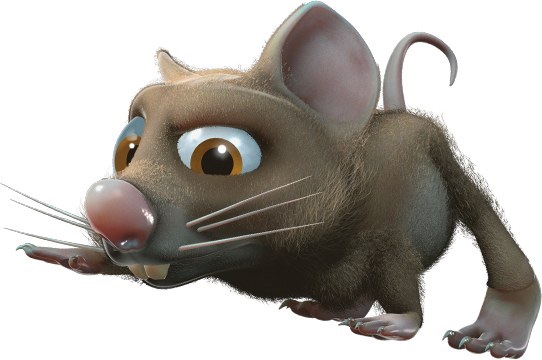Mouse Facts
There are many species of mice living in various habitats throughout the world. A mouse is a rodent like its rat, chipmunk, and squirrel cousins. Mice are active at night as they spend much of their time foraging for food. These critters are known for their curiosity, adaptability, and quick reproduction cycles.

Mouse Infestation
These whiskered pests will gladly take advantage of the warmth, shelter, and food in your home. In nature, mice build burrows with tunnel systems and eat seeds, fruits, and some crops. In the home or attic, a mouse will build a nest out of any material they can find and scavenge for food crumbs. They are omnivorous, which means they can eat both plants and meat. Mice will even eat each other if there is not enough food.
Types of Mice
Mouse Identification
Mice are small, between one and seven inches long, and weigh one-half to a whole ounce. They are usually brown, gray, or white depending on the species and have round ears, a pointed snout and a scaly tail. Mice have poor eyesight, but an excellent sense of smell and hearing. A female mouse can have four to 12 pups at a time and a new litter about every three weeks. This high reproductive rate is one of the reasons why a mouse infestation can quickly grow out of control.
Mice in the Home & Attic
Mice are usually found in walls and other spaces near food because these hungry little critters can eat around 20 times a day. You may find chewed up insulation, wiring, books, and cardboard as a female mouse will use anything she can find to build a nest. You may also notice small, 1/4-inch sized droppings that look like chocolate sprinkles in your kitchen, pantry, or other places that the mouse is finding food.
Different Kinds of Mice
Frequently Asked Questions
Do mice bite?
These little critters do not attack and bite people. More often than not, they will run away when scared. A mouse will only bite as a last resort if it is really frightened.
Do mice carry diseases?
Not only can mice contaminate food and food preparation surfaces with bacteria like salmonella, but these critters and their droppings are vectors for the Hantavirus. Mice can also bring ticks, fleas, and other parasites into your home.
What are the benefits of professional mouse pest control?
Finding and removing mice on a property can be challenging, especially if there are numerous nesting sites in the attic, basement, or walls of a business or home.
Expert pest specialists have the educational background, equipment, and skill to remove mice from a home in a safe, efficient way.
If you’re struggling with rodents like mice on your property, contact us. Our technicians can remove the critters and help you regain control of your property and sanity.


